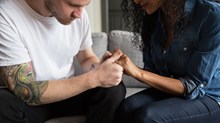Parenting Through Panic Attacks
Rebekah Lyons headed to New York looking for meaning. She likened the journey to going off to college when she was 18, only this time, she was traveling with her husband, three kids, two toy poodles, and a minivan.
Her days in suburban Atlanta, filled with trips to Target and Chick-Fil-A playgrounds, weren't satisfying her desire to engage with culture. Inspired by various speakers at Q Conferences and pastor Jon Tyson of Trinity Grace church in New York City, she and her husband, Gabe, were eager to leave the suburbs and make their faith relevant to artists, musicians, academics, government officials, and high fashion representatives in the city.
What she found there was a cesspool of stress, anxiety, and crippling fear.
"Everything in me said, I want to run back to Atlanta, I want to run back to safety," Rebekah said. "I'd rather live with an empty longing and not be crushed by panic, I thought to myself."
Panic attacks would strike on airplanes, in elevators, and subways, and often kept her from carrying out everyday tasks.
"I'd always managed my life so well, but when you can't breathe in and out without help, that's no longer possible," Rebekah said.
One of millions suffering from anxiety in America, here's what Rebekah had to say about tackling fear and anxiety head-on.
How did you find a way out of that season of panic and anxiety?
My husband Gabe knew God needed to meet me in my moments of desperation. He was always present and prayerful, but also gave me space to hurt and to cry out to God. Prayer without ceasing has also taken on such new meaning for me. I was more desperate in my prayers than in the 30 years I'd called myself a Christian. Anxiety is fear, and that's not what God orders.
During the first year I was in New York, I also met with a community of four women every Tuesday. All of us were feeling the same struggles, so we met, prayed, and named each other's strengths. As we met and attended church together, healing began taking place for all of us.
Talk about the importance of optimism and having other women "name your strengths."
It was a beautiful season. It began with us going through Ann Voskamp's One Thousand Gifts. We would tell each other, "When I see you doing this, you come alive. It's effortless for you. I want to affirm and encourage you to do that more." And we kept taking turns doing that. As we embraced that tone of encouragement, we no longer felt a need to compete or compare. The more we celebrate each other's uniqueness, the more we stop comparing. It's really fun to awaken to the natural birthright gifts God gives all of us. He does indeed give them to all of us. There is power in a small group of women who love Jesus and speak truth together.
Did you ever take medication to help with the anxiety?
While I personally did not take medication, I was ready to many times. Who knows what a week from now may look like—there may be moments I absolutely do need it. But I do think we are supposed to feel pain. When Christ suffered on Good Friday, he knew rescue wasn't going to happen in the garden. Rescue had to happen three days after his death. Christ had a redemptive story far greater than avoiding the cross, and we all have our own crosses that we bear.
What do you think causes the anxiety you experience?
In the book Man's Search for Meaning, by Holocaust survivor Viktor Frankl, he talks about how the root of anxiety is a sense of unfulfilled responsibility. I'm not completely advocating that view, but it does resonate with me in a sense. During our move to New York I was questioning, God, what do you want with my life? and, what does calling look like for women and mothers? and, how are we to be faithful as mothers of children with who we're trusted to bring up?
I had a son, Cade, with Down syndrome when I was 26. All of a sudden that gave me such empathy for the special needs community. I began to see people not for what they can do and how they can perform, but for who they are. It was like Cade looked at me and said, are you going to love me for me, or based on what milestones I can reach on time that make you feel like a good mom? He shattered my performance-based acceptance. It was God's way of saying, I want your heart to break for those that sometimes can't advocate for themselves.
What has parenting a child with special needs taught you about your own struggles with anxiety?
Our son Cade is the lifeblood of our family. His presence is grace for all of us. He doesn't bicker, argue, and negotiate, or any of the other things we all do. We love to be in relationship with him. In the city you often walk the streets and rub shoulders with thousands of people. Nobody will make eye contact, but Cade will get right up in your face. He forces people to see his humanity. It's fun to just sit back and watch people respond, because he'll take you out of your world, and show you life is happening outside of that. It's really beautiful. To sum it up, he meets people where they are, and somehow brings them out of their moments of isolation and finds a way to enter in.
Cade has taught me the importance of bringing people into our journey. I'm really encouraged by the community of families that advocate with all struggles of disabilities. In the same way, when I started suffering from panic, anxiety, and depression, it gave me empathy for people who struggle with this because I know firsthand. Now that I have language for it and I understand it, the anxiety is subsiding.
Do you ever fear relapse?
We're never at this place where we can say we're healed. I think rescue is different from healing because he requires it daily. Healing says I'm done, but rescue says Lord, I need your rescue every moment of every day, so this desperate hunger for you is our new normal. I steal away to create space and start that dialogue with God, because we can live a busy life, but it's in the stillness and the silence that God meets us.
The minute I feel pinned in, I exhale and say, God this is you, please rush in and you do what you will. Sometimes it's me taking control, trying to plan and perfect things, when he says no, let me stay in the driver's seat of your life so I can give you abundantly more than you could ask or imagine.
Was it hard to be honest and share your story with the world?
My anxiety heightened the first couple of weeks I started to share my story, but secrets lose power when they exit the dark. The minute we start to name and identify our strongholds, they start to release. The moment you start to pray, confess, and get it out there, I really believe healing starts to emerge.
When you begin to confess and name your secrets, you give permission for others to do the same. One in four women face this, and I'm hearing that from people who've read the book all the time. It's so beautiful. So I think when we share what's closest to our hearts, people find their story in ours. As women we want to know we're not alone—vulnerability is the root of connectedness.
There's responsibility that I carry with sharing my story, but I also know this is God's rescue and that he is doing something. God's going to continue to unfold whatever he has for me, for these women, for all of us. If we really do surrender our lives and say, "Lord, I need you, I need your rescue, I need your grace to pour through me, and I trust you're working something out," that posture of surrender is such a beautiful place to be.
How can people who don't struggle with anxiety help people who do?
If you're on the other side and you see people struggling, it's important to meet people there. You can't push or force people to be open, but you can be present. You can ask questions, you can make yourself available, you can check in when you see things that are more concerning. You need to be present and engaged. I think sometimes in church we minimize its severity, and it's important we understand that the struggle isn't something to be taken lightly—it can be severe, and counseling may be needed immediately. Matthew Warren's death was the catalyst for awakening us to the fact that no family is exempt from mental health issues.
Rebekah Lyons is author of Freefall to Fly: A Breathtaking Journey Toward a Life of Meaning, and is co-founder with husband Gabe of Q Ideas. Find her on Facebook and Twitter @RebekahLyons. Read her thoughts on vocation, calling, and motherhood in "Live Your Story," an article featured in TCW's July/August issue.
Read more articles that highlight writing by Christian women at ChristianityToday.com/Women
 Read These Next
Read These Next



 A Parent's Guide to AnxietyHow to help kids handle normal and abnormal fear
A Parent's Guide to AnxietyHow to help kids handle normal and abnormal fear
 Waiting for God to SpeakPsalm 28
Waiting for God to SpeakPsalm 28








 Homepage
Homepage